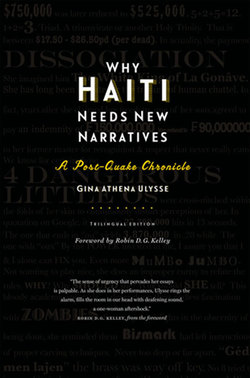Читать книгу Why Haiti Needs New Narratives - Gina Athena Ulysse - Страница 14
На сайте Литреса книга снята с продажи.
Оглавление2
Amid the Rubble and Ruin, Our Duty to Haiti Remains
January 14, 2010 / npr.org @ 11:29 a.m.
Words are especially difficult to come by in a state of numbness. My response to the outpouring of calls and e-mails from concerned friends has become something of a mantra. No, still no news yet. We have not been able to make contact with anyone. To stay sane, I have resigned myself to accepting that my immediate family will not come out of this without loss. And even if we did, the lives of the already departed and sheer magnitude of the devastation are enough to keep me catatonic.
You see, I was just in Haiti the week before Christmas. I went to the Ghetto Biennale of the Grand Rue artists. I returned from what I boasted was my best trip ever full of hope about the future. The reason for my optimism was encounters with people from Cité Soleil. Through INURED, a research institute, I met ten students who received scholarships to study in Brazil and members of a community forum that has been actively engaged in dialogue in attempts to build a broader coalition beyond politics. Their work renewed my dedication to participating in building the country again. I made a commitment to raise funds to make sure both of these efforts are successful.
Hope is not something that one often associates with Haiti. An anthropologist and critic of representations of the island, I have often questioned narratives that reduce Haiti to simple categories and in the process dehumanize Haitians. Yes, we may be the poorest nation in the Western Hemisphere, but there is life there, love, and an undeniable and unbeatable spirit of creative survivalism.
I have heard cries of Why Haiti? and Why now? or that this could have been avoided. Narratives of blame may be explanatory, but at this time they are not constructive. Since our inception as a sovereign state early in the nineteenth century, we have faced obstacles. We have had to build and rebuild before. I am worried about Haiti’s future. In the immediate moment we need help, rescue missions of all kinds. I am concerned about weeks from now when we are no longer front-page news. Without long-term efforts, we will simply not be able to rebuild. What will happen then?
My first response to seeing post-quake pictures of the capital was to ask, How will they build factories with this devastation? In the past year, the United Nations and special envoy Bill Clinton’s plans to help develop the country’s economy have virtually ignored dissent on the ground that called for a more humane approach that would not re-create the same exploitive labor relations that continue to serve the wealthy. Haiti’s government, with its absence of structure, cannot be ignored, as it is in desperate need of reinforcement, and civil space needs to be nurtured.
The folks I met last month had one response when I asked why, despite their personal hardships, they chose to engage in community building. In Creole or in French, they replied, “C’est mon devoir” (It is my duty). I was charmed by the phrase, its elegance and matter-of-factness. On this side of the water, I hold on to their words today as a sign that there is will in Haiti. When long-term efforts are on the way, the international community, too, must see it as its duty to not re-create the mistakes of the past.
